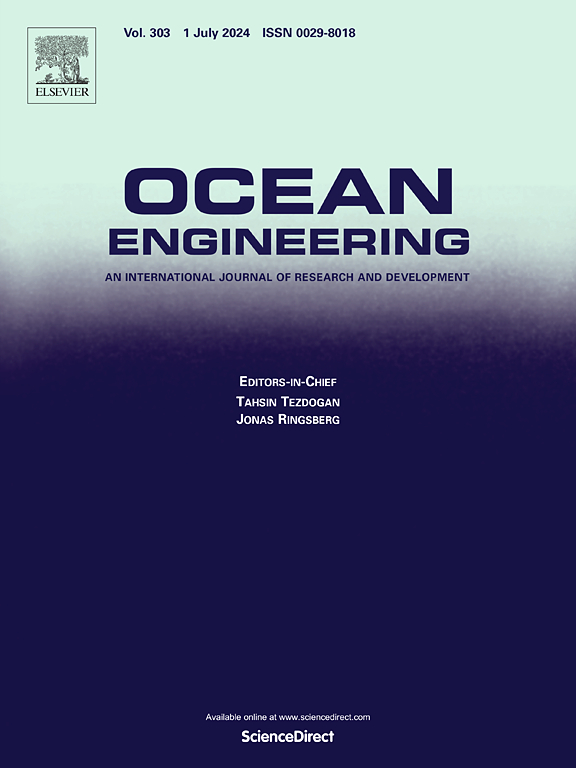考虑横摇约束的无人帆船自适应粒子群速度优化方法
IF 4.6
2区 工程技术
Q1 ENGINEERING, CIVIL
引用次数: 0
摘要
无人驾驶帆船越来越多地用于海洋数据收集和环境监测。然而,在复杂海况下,如何在保证航行安全的同时优化航速面临着重大挑战。值得注意的是,航行时大的横摇角会大大增加倾覆的风险。针对这一问题,建立了无人帆船的6自由度动力学模型,提出了一种带滚转约束的自适应粒子群速度优化算法。该算法用于优化船帆角,以实现最大航速和最小横摇角。采用动态目标约束处理方法,将单目标约束转化为双目标优化问题,并将横摇角约束映射到翼帆的输入参数上。将输出速度最大、横摇角最小的最优帆角应用于无人帆船,形成反馈控制。海试结果证明了该算法的优越性、有效性和鲁棒性。本文章由计算机程序翻译,如有差异,请以英文原文为准。
A self-adaptive particle swarm speed optimization method for unmanned sailboats considering roll constraint
The unmanned sailboat is increasingly used for marine data collection and environmental monitoring. However, it faces significant challenges in optimizing speed under complex sea conditions while ensuring navigation safety. Notably, large roll angle during navigation can greatly increase the risk of capsizing. To address this problem, a 6-degree-of-freedom dynamic model of the unmanned sailboat is established, and a self-adaptive particle swarm speed optimization algorithm with roll constraint is proposed. This algorithm is used to optimize the sail angle to achieve maximum speed while minimizing roll angle. It adopts dynamic-objective constraint-handling method to convert the single-objective constraint into a bi-objective optimization problem, and maps the roll angle constraint onto the input parameters of the wing sail. The optimized sail angle with maximum output speed and minimum roll angle is applied to the unmanned sailboat to form a feedback control. The sea trial has been performed and the results demonstrate the superiority, effectiveness, and robustness of the proposed algorithm.
求助全文
通过发布文献求助,成功后即可免费获取论文全文。
去求助
来源期刊

Ocean Engineering
工程技术-工程:大洋
CiteScore
7.30
自引率
34.00%
发文量
2379
审稿时长
8.1 months
期刊介绍:
Ocean Engineering provides a medium for the publication of original research and development work in the field of ocean engineering. Ocean Engineering seeks papers in the following topics.
 求助内容:
求助内容: 应助结果提醒方式:
应助结果提醒方式:


